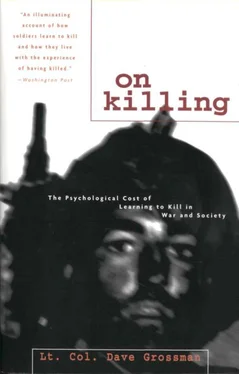In Luke 22:36, just minutes before his arrest and subsequent crucifixion, Jesus commanded his disciples that “he that hath no sword, let him sell his garment, and buy one.” They had three swords among them, and when the soldiers came to arrest Jesus, Peter drew his. But Jesus commanded him to put it away, saying, “He that lives by the sword shall die by the sword,” meaning that if the sword is your law, you should die by the sword — the sword wielded by the agents of the government, and in Romans 13:4 Paul wrote that the government “beareth not the sword in vain.”
Thus there is a foundation for the argument that (1) “Thou shalt not kill” is a poor translation taken grossly out of context and (2) this has been responsible for doing great emotional harm to our veterans. The position outlined above has been, and continues to be, the one accepted by much of Catholic and Protestant Christianity for two millennia. This has been the philosophical justification for the church’s support for fighting to free the slaves in the Civil War and fighting Germany and Japan in World War II. Today many churches hold that those who have died for our nation are exemplifying Jesus’ love and Jesus’ sacrifice for every one of us, for Jesus said, “Greater love has no man than this, that he give his life for his friends.”
An interview with a veteran who was a retired law-enforcement officer led me to realize that moral distance is the dominant factor that enables violence and the rationalization of violence among police forces. When I described the distance processes to him he pointed out that the establishment and maintenance of what I was calling moral distance are essential to the mental health of police officers, and on a good force it is the primary enabling process. If, on the other hand, the racial and ethnic hatred of cultural distance begins to set in, then there are problems, and a kind of moral rot can cut into the soul of the police force.
It is interesting to observe how many of these “punishment” motivators were, in retrospect, less than legitimate. We really never did find out what caused the sinking of the Maine, and it might very well have been an accident. The Lusitania was carrying war munitions, and the Germans did give us fair warning. And the Gulf of Tonkin Incident appears to have been almost completely fabricated by President Johnson. In most of these cases, though, the politicians were motivated to use these incidents as a rally to excite the popular imagination in order to get involved in a war that they (the politicians) thought was morally legitimate.
The great British statesman Benjamin Disraeli observed that the role of such “passion” issues would always be a key aspect of a democracy’s entry into war. “If,” said Disraeli,
you establish a democracy, you must in due season reap the fruits of a democracy…. You will in due season have wars entered into from passion, and not from reason; and you will in due season submit to peace… which will diminish your authority and perhaps endanger your independence. You will, in due season, with a democracy find that your property is less valuable and that your freedom is less complete.
B. F. Skinner’s operant conditioning theory and its application to killing will be looked at in greater detail in subsequent sections. His theory is basically that aspect of psychology which most people associate with the lab rat conditioned to press a bar for food. From Skinner’s research has arisen a body of psychological thought and theory that is probably matched only by Freud’s in its influence.
Modern snipers are enabled by group processes, since they are almost always teamed with a spotter who provides mutual accountability and turns the sniper into a crew-served weapon. In addition, snipers are enabled by (1) the physical distance at which they fire, (2) the mechanical distance created by viewing the enemy through a scope, and (3) a temperament predisposed to the job, due to their careful selection by command and self-selection through their willingness to volunteer for the job.
But of course the Rhodesians won all the battles and lost the war — as did the U.S. forces in Vietnam. I would submit that in both cases this is because the “enemy” was willing to absorb these horrendous losses, while the Americans and the Rhodesians were not. This is partially a reflection on the impact of moral distance, but it is also a matter of political will and the effectiveness of democracies versus totalitarian forms of government in times of war, and that is a factor that is generally outside the realm of consideration of this study.
Like most personality disorders, this one is a continuum that contains many individuals who, while they would not meet the full diagnostic criteria, are on the borderline of antisocial personality disorder. The DSM-III-R tells us that some individuals “who have several features of the disorder [but not enough to be diagnosed with it] achieve political and economic success,” and some successful combatants may also fit into this category.
Terry Pratchett, in his book Witches Abroad, captured (in a metaphoric sense that Jung would have loved) the essence of the power of archetypal roles and their ability to entrap and warp lives:
Stories exist independently of their players. If you know that, the knowledge is power.
Stories, great flapping ribbons of shaped space-time, have been blowing and uncoiling around the universe since the beginning of time. And they have evolved. The weakest have died and the strongest have survived and they have grown fat on the retelling… stories, twisting and blowing through the darkness.
And their very existence overlays a faint but insistent pattern on the chaos that is history. Stories etch grooves deep enough for people to follow in the same way that water follows certain paths down a mountainside. And every time fresh actors tread the path of the story, the groove runs deeper.
Pratchett calls this “the theory of narrative causality,” and he is quite correct in noting that in its most extreme form the archetype, or the “story,” can have a dysfunctional influence on lives. “Stories don’t care who takes part in them,” says Pratchett. “All that matters is that the story gets told, that the story repeats. Or, if you prefer to think of it like this: stories are a parasitical life form, warping lives in the service only of the story itself.”
This is especially true if (1) society invests and entraps an individual in a role — for example, the role of the hero who bathes in blood and gore while slaying the “dragon,” and then (2) society cuts the story short and refuses to continue to play its part in the age-old drama/story of the returning warrior. Which is exactly what America did to her returning Vietnam veterans. But that is a story for a later chapter.
Synthesizing various models and variables into a single paradigm may assist in providing a more detailed understanding of the soldier’s response to killing circumstances on the battlefield. It may even be possible to develop an equation that can represent the total resistance involved in a specific killing circumstance.
The variables represented in our equation include:
• Probability of Personal Kill= total probability of execution of specific personal kill (This is an estimation of the total psychological leverage available to enable the execution of a specific personal kill in a specific circumstance.)
Читать дальше







